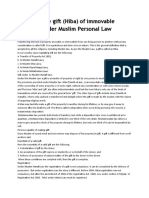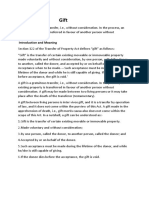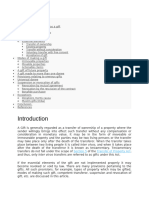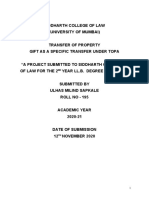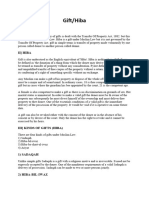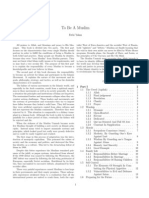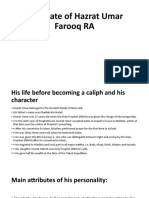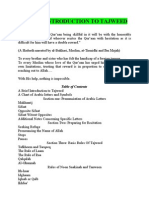Hiba Under Muslim Law
Hiba Under Muslim Law
Uploaded by
Sourabh YadavCopyright:
Available Formats
Hiba Under Muslim Law
Hiba Under Muslim Law
Uploaded by
Sourabh YadavOriginal Description:
Copyright
Available Formats
Share this document
Did you find this document useful?
Is this content inappropriate?
Copyright:
Available Formats
Hiba Under Muslim Law
Hiba Under Muslim Law
Uploaded by
Sourabh YadavCopyright:
Available Formats
Hiba (Muslim Gift)
Gift is a generic term that includes all transfers of property without consideration. In India, Gift is considered equivalent to Hiba but technically, Gift has a much wider scope than Hiba. The word Hiba literally means, the donation of a thing from which the donee may derive a benefit. It must be immediate and complete. The most essential element of Hiba is the declaration, "I have given". As per Hedaya, Hiba is defined technically as:"Unconditional transfer of property made immediately and without any exchange or consideration, by one person to another and accepted by or on behalf of the latter". According to Fyzee, Hiba is the immediate and unqualified transfer of the corpus of the property without any return. Essential Elements of a Gift Since Muslim law views the law of Gift as a part of law of contract, there must be an offer (izab), an acceptance (qabul), and transfer (qabza). Thus, the following are the essentials of a valid gift 1. A declaration by the donor - There must be a clear and unambiguous intention of the donor to make a gift. 2. Acceptance by the donee - A gift is void if the donee has not given his acceptance. Legal guardian may accept on behalf of a minor. 3. Delivery of possession by the donor and taking of the possession by the donee. In Muslim law the term possession means only such possession as the nature of the subject is capable of. Thus, the real test of the delivery of possession is to see who - whether the donor or the donee - reaps the benefits of the property. If the donor is reaping the benefit then the delivery is not done and the gift is invalid. The following are the conditions which must be satisfied for a valid gift. 1. Parties - There must be two parties to a gift transaction - the donor and the donee. Conditions for Donor - (Who can give) 1. Must have attained the age of majority - Governed by Indian Majority Act 1875. 2. Must be of sound mind and have understanding of the transaction.
3. Must be free of any fraudulent or coercive advice as well as undue influence. 4. Must have ownership over the property to be transferred by way of gift. A gift by a married woman is valid and is subjected to same legal rules and consequences. A gift by a pardanashin woman is also valid but in case of a dispute the burden of proof that the transaction was not conducted by coercion or undue influence is on the donee. Gift by a person in insolvent circumstances is valid provided that it is bona fide and not merely intended to defraud the creditors. Conditions for Donee (who can receive) 1. Any person capable of holding property, which includes a juristic person, may be the donee of a gift. A Muslim may also make a lawful gift to a non-Muslim. 2. Donee must be in existence at the time of giving the gift. In case of a minor or lunatic, the possession must be given to the legal guardian otherwise the gift is void. 3. Gift to an unborn person is void. However, gift of future usufructs to an unborn person is valid provided that the donee is in being when the interest opens out for heirs. 2. Subject Matter of Hiba 1. It must be designable under the term (maal-thing or goods). 2. It must be in existence at the time when the gift is made. Thus, gift of anything that is to be made in future is void. 3. The donor must own the gift. Muslim law recognizes the difference between the corpus and the usufructs of a property. Corpus means the absolute right of ownership of the property which is heritable and is unlimited in point of time, while, usufructs means the right to use and enjoy the property. It is limited and is not heritable. The gift of the corpus of a thing is called Hiba and the gift of only the usufructs of a property is called Areeat. Gift of an indivisible property can be made to more than one persons. 3. Extent of Donors right to gift - General rule is that a donors right to gift is unrestricted. In Ranee Khajoorunissa vs Mst Roushan Jahan, it was recognized by the privy council that a donor may gift all or any portion of his property even if it adversely affects the expectant heirs. However, there is one exception that the right of gift of a person on death bed (Marz ul maut) is restricted in following ways - He cannot gift more than one third of his property and he cannot gift it to any of his heirs.
Kinds of Gift: There are several variations of Hiba. For example, Hiba bil Iwaz, Hiba ba Shart ul Iwaz, Sadaq and Areeat. Hiba Bil Iwaz Hiba means gift and Iwaz means consideration. Hiba Bil Iwaz means gift for consideration already received. It is thus a transaction made up of two mutual or reciprocal gifts between two persons. One gift from donor to donee and one from donee to donor. The gift and return gift are independent transactions which together make up Hiba bil Iwaz. In India, it was introduced as a device for effecting a gift of Mushaa in a property capable of division. So a Hiba Bil Iwaz is a gift for consideration and in reality it is a sale. Thus, registration of the gift is necessary and the delivery of possession is not essential and prohibition against Mushaa does not exist. The following are requisites of Hiba bil Iwaz 1. Actual payment of consideration on the part of the donee is necessary. In Khajoorunissa vs Raushan Begam, held that adequacy of the consideration is not the question. As long is the consideration is bona fide, it is valid no matter even if it is insufficient. 2. A bona fide intention on the part of the donor to divest himself of the property is essential. Gift in lieu of dower debt - In Gulam Abbas vs Razia AIR 1951, All HC held that an oral transfer of immovable property worth more than 100/- cannot be validly made by a muslim husband to his wife by way of gift in lieu of dower debt which is also more than 100/-. It is neither Hiba nor Hiba bil Iwaz. It is a sale and must done through a registered instrument. Hiba ba Shartul Iwaz Shart means stipulation and Hiba ba Shart ul Iwaz means a gift made with a stipulation for return. Unlike in Hiba bil Iwaz, the payment of consideration is postponed. Since the payment of consideration is not immediate the delivery of possession is essential. The transaction becomes final immediately upon delivery. When the consideration is paid, it assumes the character of a sale and is subject to presumption (Shufa). As in sale, either party can return the subject of the sale in case of a defect. It has the following requisites -
1. 2. 3. 4.
Delivery of possession is necessary. It is revocable until the Iwaz is paid. It becomes irrevocable after the payment of Iwaz. Transaction when completed by payment of Iwaz, assumes the character of a sale.
In general, Hiba bil Iwaz and Hiba ba Shart ul Iwaz are similar in the sense that they are both gifts for a return and the gifts must be made in compliance with all the rules relating to simple gifts. Differences between Hiba, Hiba bil Iwaz, and Hiba ba Shart ul Iwaz Hiba Hiba bil Iwaz Hiba ba Shart ul Iwaz Ownership in property is transferred for consideration called iwaz, with an express agreement for a return. possession is
Ownership in property is Ownership in property is transferred for consideration transfered without called iwaz. But there is no consideration. express agreement for a return. Iwaz is voluntary.
Delivery of possession is Delivery of possession is NOT Delivery of essential. essential. essential.
Gift of mushaa where a Gift of mushaa even where a Gift of mushaa where a property is divisible is property is divisible is valid. property is divisible is invalid. invalid. Barring a few exceptions It is irrevocable. it is revocable. It is a pure gift. It is like a contract of sale. It is revocable until the iwaz is paid. Irrevocable after that. In its inception it is a gift but becomes a sale after the iwaz is paid.
Exceptions in delivery of possession The following are the cases where deliver of possession by the donor to the donee is not required 1. Gift by a father to his minor or lunatic son. 2. When the donor and the donee reside in the same house which is to be gifted. In such a case, departure of the donor from the house is not required. 3. Gift by husband to wife or vice versa. The delivery of possession is not required if the donor had a real and bona fide intention of making the gift. 4. Gift by one co-sharer to other. Bona fide intention to gift is required. 5. Part delivery - Where there is evidence that some of the properties in a gift were delivered, the delivery of the rest may be inferred.
6. Zamindari villages - Delivery is not required where the gift includes parcels of land in zamindari if the physical possession is immpossible. Such gift may be completed by mutation of names and transfer of rents and incomes. 7. Subject matter in occupation of tenant - If a tenant is occupying the property the gift may be affected by change in ownership records and by a request to the tenant to attorn the donee. 8. Incorporeal rights - The gift may be completed by any appropriate method of transfering all the control that the nature of the gift admits from the donor to the donee. Thus, a gift of govt. promissory note may be affected by endorsement and delivery to the donee. 9. Where the donee is in possession - Where the donee is already in possession of the property, delivery is not required. However, if the property is in adverse possession of the donee, the gift is not valid unless either the donor recovers the possession and delivers it to donee or does all that is in his power to let the donee take the possession. Void Gifts The following gifts are void 1. Gifts in future - A thing that is to come into existence in future cannot be made. Thus, a gift of a crop that will come up in future is void. 2. Contingent gift - A gift that takes affect after the happening of a contingency is void. Thus a gift by A to B if A does not get a male heir is void. Gift with a condition A gift must always be unconditional. When a gift is made with a condition that obstructs its completeness, the gift is valid but the condition becomes void. Thus, if A gifts B his house on a condition that B will not sell it or B will sell it only to C, the condition is void and B takes full rights of the house. Doctrine of Mushaa Mushaa means undivided share in a property. The gift of undivided share in an indivisible property is valid under all schools but there is no unanimity of opinion amongst different schools about gift of undivided share in a property that is divisible. In Shafai and Ithna Asharia laws it is valid if the donor withdraws his control over the property in favor of the donee. But under Hanafi law, such a gift is invalid unless it is separated and delivered to the donee. Illustration A, B, and C are the co-owners of a house. Since a house cannot be divided, A can give his undivided share of the house to D in gift.
A, B, and C are the co-owners of 3 Tons of Wheat, under Shafai and Ithna Ahsharia law, A can give his undivided share of the wheat to D if he withdraws control over it but under Hanafi law, A cannot do so unless the wheat is divided and the A delivers the possession of 1 ton of wheat to D. Gift of mushaa where property indivisible- A valid gift may be made of an undivided share (mushaa) in property which is not capable of partition. Gift of mushaa where property divisible- A gift of an undivided share (mushaa) in property which is capable of division is irregular (fasid) but not void (batil). The gift being irregular, and not void, it may be perfected and rendered valid by subsequent partition and delivery to the donee of the share given to him. If possession is once taken the gift is validated. Exceptions: A gift of an undivided share (mushaa), though it be a share in property capable of division, is valid from the moment of the gift, even if the share is not divided off and delivered to the donee, in the following cases: (1) Where the gift is made by one co-heir to another; (2) Where the gift is of a share in a zamindari or taluka; (3) Where the gift is of a share in freehold property in a large commercial town; (4) Where the gift is of shares in a landed company. It is observed that Mushaa is an undivided share in property, either moveable or immoveable; that a valid gift may be made of an undivided share in property, which is not capable of partition, and, that a gift of an undivided share in property, which is capable of division, except in the four cases as mentioned above, is only irregular, and not void; but, if possession is once taken under the gift, it is validated. In the four exceptions, however, the gift is valid from the moment of the gift. Revocation of a Gift Under muslim law, all volutary transactions are revocable and so under Hanafi law a gift is also generally revocable, though it is held to be abominable. In Shia law, a gift can be revoked by mere declaration while in Sunni law, it can be revoked only by the intervention of the court of law or by the consent of the donee. The following gifts, however, are absolutely irrevocable 1. When the donor is dead. 2. When the donee is dead. 3. When the donee is related to the donor in prohibited degrees on consanguinity. However, in Shia law, a gift to any blood relative is irrevocable.
4. When donor and the donee stand in marital relationship. However, in Shia law, a gift to husband by wife or vice versa is revocable. 5. When the subject of the gift has been transferred by the donee through a sale or gift. 6. When the subject of the gift is lost or destroyed, or so changed as to lose its identity. 7. When the subject of the gift has increased in value and the increment is inseparable. 8. When the gift is a sadaq. 9. When anything has been accepted in return. The gift of the corpus of a thing is called Hiba and the gift of only the usufructs of a property is called Areeat.
Death Bed Gift (Marz-ul-maut) is part of Will (Wasiyat) It is suggested to go through the class notes also.
You might also like
- Muslim Family Law in India (Part 1: Sources of Law, Marriage, Divorce, Maintenance, Guardianship)From EverandMuslim Family Law in India (Part 1: Sources of Law, Marriage, Divorce, Maintenance, Guardianship)Rating: 4 out of 5 stars4/5 (6)
- Gift, HibbaDocument5 pagesGift, HibbaBhupendra SainiNo ratings yet
- HibaDocument5 pagesHibaShital ModiNo ratings yet
- Hiba Under Muslim LawDocument7 pagesHiba Under Muslim LawManini JaiswalNo ratings yet
- Gift (Hiba) PDFDocument21 pagesGift (Hiba) PDFShankha Shubhra ChakrabartyNo ratings yet
- Gift OR Hiba: Under Muslim LawDocument24 pagesGift OR Hiba: Under Muslim Lawakshay kharteNo ratings yet
- Hiba .Gifts Under Muslim LawDocument7 pagesHiba .Gifts Under Muslim Lawna.real.8801No ratings yet
- F Law AssignmentDocument11 pagesF Law AssignmentshekharNo ratings yet
- Family Law - II Assignment - 2k19Document10 pagesFamily Law - II Assignment - 2k19surya srivastavaNo ratings yet
- Topic: Hiba: Hiba:-Hiba (Tamlik Al Ain) Is "An Act of Bounty by Which A Right ofDocument10 pagesTopic: Hiba: Hiba:-Hiba (Tamlik Al Ain) Is "An Act of Bounty by Which A Right ofsparsh lalNo ratings yet
- GiftDocument2 pagesGiftPallavi UNo ratings yet
- Concept of Gift Under Islamic Law: Transfer of Property Act, 1882Document34 pagesConcept of Gift Under Islamic Law: Transfer of Property Act, 1882Fazal MuezNo ratings yet
- Class 10 Concept of HibaDocument20 pagesClass 10 Concept of Hibavefoh33863No ratings yet
- A Comparative Study Between Muslim Gift and WillDocument10 pagesA Comparative Study Between Muslim Gift and WillNewbieGamers - নিউবি গেমার্সNo ratings yet
- Comparative study of Gift under Islamic Law andDocument13 pagesComparative study of Gift under Islamic Law andsharadmishra123No ratings yet
- GIFTDocument19 pagesGIFTrajputpawan1110No ratings yet
- HIBADocument9 pagesHIBAaditya.ismadovermeNo ratings yet
- Concept of Hiba Under Muslim LawDocument14 pagesConcept of Hiba Under Muslim LawHARSHIT MAHALWAL100% (10)
- Different Kinds of GiftsDocument10 pagesDifferent Kinds of GiftsAshok K Pandey100% (1)
- Family Law II - Unit 3Document6 pagesFamily Law II - Unit 3divyaNo ratings yet
- Transfer of Property ActDocument11 pagesTransfer of Property ActAditya Dassaur100% (1)
- Gifts Under Muslim LawDocument12 pagesGifts Under Muslim LawAnanyaNo ratings yet
- Law of Hiba (Muslim Law) Pankaj KumarDocument12 pagesLaw of Hiba (Muslim Law) Pankaj Kumaranjanaanju1729nNo ratings yet
- Gift and WillDocument31 pagesGift and WillZobaida Khatun JulieNo ratings yet
- TPA FinalDocument15 pagesTPA FinalMd Arifin ArifNo ratings yet
- Gift Under TPADocument4 pagesGift Under TPAanittaNo ratings yet
- How To Make Gift (Hiba) of Immovable Property Under Muslim Personal LawDocument2 pagesHow To Make Gift (Hiba) of Immovable Property Under Muslim Personal Lawmd airfNo ratings yet
- Concept of Gift Under The Transfer of Property ActDocument11 pagesConcept of Gift Under The Transfer of Property ActRajivNo ratings yet
- Family LawDocument10 pagesFamily LawRaghavendra SinghNo ratings yet
- Gifts Under Muslim Law NotesDocument11 pagesGifts Under Muslim Law NotesIndraveer Singh100% (1)
- GiftDocument9 pagesGiftCharan NNo ratings yet
- GIFTDocument45 pagesGIFTUzma SheikhNo ratings yet
- GIFTDocument19 pagesGIFTrajputpawan1110No ratings yet
- Hiba English Https - Blog - Ipleaders.in - Hiba-Gift-Muslim-Law - Amp 1Document12 pagesHiba English Https - Blog - Ipleaders.in - Hiba-Gift-Muslim-Law - Amp 1MD SOHRABNo ratings yet
- Unit III - GiftDocument35 pagesUnit III - GiftSrinath LNo ratings yet
- Kinds of Gifts Under Muslim LawDocument4 pagesKinds of Gifts Under Muslim LawDILIP DESHMUKHNo ratings yet
- Gift Under Islamic LawDocument5 pagesGift Under Islamic LawManpreet SinghNo ratings yet
- Siddharth College of Law (Mumbai) : Subject: - Transfer of Property ActDocument12 pagesSiddharth College of Law (Mumbai) : Subject: - Transfer of Property ActYogesh SaindaneNo ratings yet
- Unit-6 FDocument9 pagesUnit-6 FKanishkaNo ratings yet
- GiftsDocument16 pagesGiftschetanasreenathNo ratings yet
- Unit 18 - Gifts and Will (Wasiyat) Under Muslim LawDocument7 pagesUnit 18 - Gifts and Will (Wasiyat) Under Muslim Lawhaxaniv724No ratings yet
- Muslim Personal LawDocument43 pagesMuslim Personal LawSajad HussainNo ratings yet
- Muslim LawDocument8 pagesMuslim Lawnandanavsai20bbaNo ratings yet
- GIFTDocument7 pagesGIFTtillingtabing20xxNo ratings yet
- 6 Gift-1-1Document8 pages6 Gift-1-1amit HCSNo ratings yet
- HibaDocument4 pagesHibaArpan GaraiNo ratings yet
- GiftDocument15 pagesGiftTshewang DemaNo ratings yet
- Transfer of PropertyDocument18 pagesTransfer of Propertynitin0010No ratings yet
- Name - Amir Subhani Khan Course-Ba LLB (Hons.) Semester - Iv Roll No - 10 Topic - Gift and Will Submitted To - Prof. Kahkashan Y. DanyalDocument9 pagesName - Amir Subhani Khan Course-Ba LLB (Hons.) Semester - Iv Roll No - 10 Topic - Gift and Will Submitted To - Prof. Kahkashan Y. DanyalAmir KhanNo ratings yet
- 3 Essential Conditions For A Valid GiftDocument10 pages3 Essential Conditions For A Valid GiftAbdul Samad Shaikh67% (3)
- Muslim Law 5 Sem. Unit 1 Hiba: Ibadat (Religious Matters) or Muamalat (Worldly Matters) - An Oral Declaration MayDocument11 pagesMuslim Law 5 Sem. Unit 1 Hiba: Ibadat (Religious Matters) or Muamalat (Worldly Matters) - An Oral Declaration MayAayush ShuklaNo ratings yet
- Meaning and Definition of GiftDocument12 pagesMeaning and Definition of GiftAbdul Basit QaziNo ratings yet
- Article On Gift Is Absolute Transfer of Property by Rajdeep DuttaDocument3 pagesArticle On Gift Is Absolute Transfer of Property by Rajdeep DuttaRajdeep Dutta0% (1)
- Gift (Hiba) and Wills by Muslim Family LawDocument43 pagesGift (Hiba) and Wills by Muslim Family LawGhulam Abbas Khan WattooNo ratings yet
- Gift/ HibaDocument22 pagesGift/ HibaAnirudh PrasadNo ratings yet
- Essentials of Gift (Hiba) : Declaration Acceptance Delivery of PossessionDocument8 pagesEssentials of Gift (Hiba) : Declaration Acceptance Delivery of PossessionSuchitraNo ratings yet
- 3 Essential Conditions GiftDocument13 pages3 Essential Conditions GiftPMG KarachiNo ratings yet
- To Be A Muslim by Fathi YakanDocument37 pagesTo Be A Muslim by Fathi Yakanabuali-almaghribi100% (2)
- Grade 6 - Revision Worksheet - Term 1 Exam 2021-22Document4 pagesGrade 6 - Revision Worksheet - Term 1 Exam 2021-22Ammar bin yasirNo ratings yet
- Caliphate of Hazrat Umar Farooq RADocument15 pagesCaliphate of Hazrat Umar Farooq RAsyed babar khan babar khanNo ratings yet
- 4g Upgradation Work Under Rural Network Expansion ProjectDocument122 pages4g Upgradation Work Under Rural Network Expansion ProjectMoktadir ChowdhuryNo ratings yet
- History in Short ..: Pak Studies Paper 1 HistoryDocument40 pagesHistory in Short ..: Pak Studies Paper 1 HistoryMuhammad KhanNo ratings yet
- Army of God SummaryDocument10 pagesArmy of God SummaryNath RangersNo ratings yet
- Makalah Isu-Isu KewarganegaraanDocument15 pagesMakalah Isu-Isu KewarganegaraanAlexaa ArsttNo ratings yet
- Ilm Khair-Ul-Anam Bata-e-Rub-ul-Nam (S.W.A) by - Molana Abo-ul-Basat Muhammad Abdul Salam Rizvi NaqshbandiDocument446 pagesIlm Khair-Ul-Anam Bata-e-Rub-ul-Nam (S.W.A) by - Molana Abo-ul-Basat Muhammad Abdul Salam Rizvi NaqshbandiMarfat LibraryNo ratings yet
- Jadwal Paparan Proposal KKN Alt 2B 2019 - 1556154795Document4 pagesJadwal Paparan Proposal KKN Alt 2B 2019 - 1556154795Fen-fen Feny PutriMardianata ThejackangelsejatiNo ratings yet
- Avicennas Metaphysics in ContextDocument316 pagesAvicennas Metaphysics in ContextAbdel IlahNo ratings yet
- Assignment No. 2Document2 pagesAssignment No. 2faisal copier100% (1)
- Fareme CalaDocument8 pagesFareme Calamikaela.chigoraNo ratings yet
- Modul Akidah Akhlak 8Document8 pagesModul Akidah Akhlak 8winaNo ratings yet
- 31-Hasil Ujian Toefl Gasal 2019-2020Document31 pages31-Hasil Ujian Toefl Gasal 2019-2020Ema Mar'ati SholechaNo ratings yet
- Sman 39 Jakarta: Ekonomi X IPS 1Document4 pagesSman 39 Jakarta: Ekonomi X IPS 1Bela safitriNo ratings yet
- Partition of Bengal (1905) - WikipediaDocument8 pagesPartition of Bengal (1905) - WikipediaHAmid RAzaNo ratings yet
- Bukit Rata Kamboja - BDocument14 pagesBukit Rata Kamboja - BmaimunahNo ratings yet
- Refrensi Prosedur Penyelenggaraan Jenazah Muhammad Fahrul AizatDocument4 pagesRefrensi Prosedur Penyelenggaraan Jenazah Muhammad Fahrul Aizatlike batamNo ratings yet
- Paper - An Early Muṣḥaf According To The Reading of Ibn ĀmirDocument20 pagesPaper - An Early Muṣḥaf According To The Reading of Ibn ĀmirAbu Shu'aibNo ratings yet
- Dzikir Dan DoaDocument2 pagesDzikir Dan DoaikalisnahidayatNo ratings yet
- A Brief Introduction To TajweedDocument36 pagesA Brief Introduction To Tajweedgoodarsh100% (1)
- Qiraat Al Fiil Ting 3Document16 pagesQiraat Al Fiil Ting 3Free PalestineNo ratings yet
- GTK Non Pns Pada Madrasah Swasta Januari SD Maret Kanwil Catatan (Kota Jakarta Utara) 1Document40 pagesGTK Non Pns Pada Madrasah Swasta Januari SD Maret Kanwil Catatan (Kota Jakarta Utara) 1Asya RamadlaniNo ratings yet
- Armageddon PDFDocument31 pagesArmageddon PDFshafik7No ratings yet
- MALIKI SCHOOL OriginalDocument7 pagesMALIKI SCHOOL OriginalshadmaanNo ratings yet
- 198 Hizbul AzamDocument347 pages198 Hizbul AzamAsif RazaNo ratings yet
- Is Makkah Turning Green A Sign of Qiyamah - Life in Saudi ArabiaDocument1 pageIs Makkah Turning Green A Sign of Qiyamah - Life in Saudi ArabiaResha RofifahNo ratings yet
- Rough RespondantDocument39 pagesRough Respondantaditim1308No ratings yet
- Partition of IndiaDocument36 pagesPartition of IndiasimranNo ratings yet
- El-Tahry Nevin Reda 20106 PHD ThesisDocument231 pagesEl-Tahry Nevin Reda 20106 PHD ThesisshirazmohamedaliNo ratings yet



























